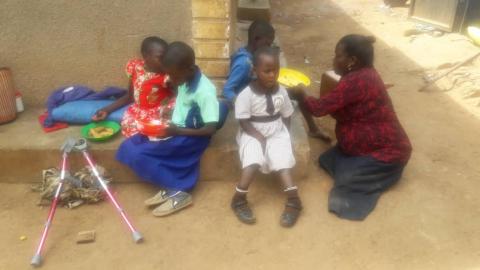Disabled Woman Gives Hope to 50 Needy Children
 Submitted by jbimokola on
Submitted by jbimokola on

A 35-year old Noelina Nakagwa, a resident of Lukulula in Masaka district is taking care of more than 60 children, despite being disabled. Born with missing lower limbs, Nakagwa has been able to take care of the disabled and other needy children with the little income she earns from small scale farming, where she grows maize and other food stuffs.
Her being disabled did not limit her from helping disabled and abandoned children, as well as those living with HIV/AIDS.
“We all are important; disabled or not, we all can make a contribution to our society and country at large, that is why I decided to take on this responsibility and take care of children with disabilities and those leaving with HIV/AIDS to show them that they too are important to the community,” says Nakagwa.
She admits facing challenges with supporting the children as they have different disabilities and therefore have different needs, including specialized attention.
Among the children are eleven who are deaf and dumb, one blind child, fourteen lame children, five children that lost their parents to HIV/AIDS and they too are living with HIV/AIDS and eighteen children that were abandoned by their parents.
Among the challenges she is faced with are difficulties in providing health care and education.
With education, stakeholders and the beneficiaries of her helping hand also help her to contribute some money for the children’s school fees and scholastic materials. The schools to which the children go have been sympathetic to let the children study and have bursaries. Segujja John Mary is the deputy head teacher of Lukulula Secondary School said, where some of the children go to school. “As the administration, we understand the difficulties faced by Ms Nakagwa and happy about her efforts to empower the children with disabilities. We accepted to take on two children on half bursary each year and we are patient with the rest and at times let them study on loan,” said Segujja.
With medical services, Nakagwa is assisted by hospitals like Masaka referral hospital, Lukulula health centre IV and Wellspring Children’s Medical Centre, Kamutuluza. These provide medical services to the children at a low cost and sometimes at no cost. Through Masaka referral hospital, she was able to meet a kind-hearted medical doctor from the United Kingdom decided to buy some land in Lukulula and constructed a modern facility that can accommodate over fifty-five children in which they have spent the last three months. Counselling services are also offered to the children by Sign Health, Uganda.
Children learn sign language to enable communication with those having hearing and speech disability. Morals and values are emphasized to enable them associate with one another.
Nakagwa was born to a family of four children and was brought up like any other child. In 2004, she adopted a disabled Nabukeera Kamiati, whom she had watched being locked up in a kennel-like structure. She insisted on talking to her parents to let her out and treat her like any other child but in vain and on the third attempt to convince the parents, they gladly told her “Kitwale bwoba okyagala,” meaning ‘take it if you wish.’ After ten years staying with Nabukeera, she was forced to take on children with disabilities and children that have been abandoned by their parents after realizing how much she had changed the life of Nabukeera.
In May 2018, Nakagwa changed the name of the organisation from Lukulula Orphanage for Disabled, Deaf and Blind Development Centre to Wellspring Disabled Children’s Home. She now has fifty-three children under her care, including her two biological children that help her with the work at the orphanage and seven that successfully completed studies in higher institutions of learning.
“I am grateful to Ms Nakagwa for empowering me and showing me that I can be useful to society despite my disability,” said John Mary Ssekiziyivu, one of the children that graduated from Kyambogo University as a laboratory technician through support from Nakagwa.
Nakagwa hopes for equality for persons with disability as some of them are often looked at as useless in society and locked away in cages like animals by their parents and guardians, and never get the opportunity to go to school or attain any skills.
- Log in to post comments
- 820 reads
